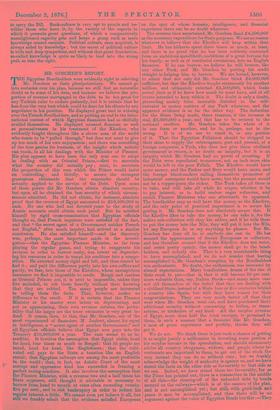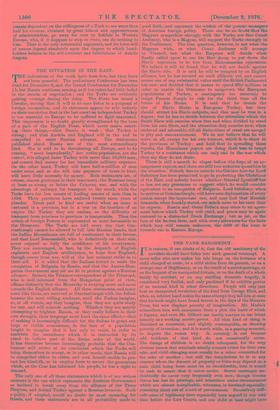GOSCHEN'S REPORT.
THEEgyptian Bondholders were evidently right in selecting Mr. Goschen as their plenipotentiary. We cannot go into ecstacies over his plan, because we still feel an incurable doubt as to some iaf his data, and because we believe the pro- portion of revenue mortgaged to the debt to be too great for any Turkish ruler to endure patiently, but it is certain that he has done the very best which could be done for his clients by any negotiator in his position. He displayed great tact in winning over the French Bondholders, and so putting an end to the inter- national contest of which Egyptian financiers had so skilfully availed themselves. He displayed unusual firmness as well as persuasiveness in his treatment of the Khedive, who evidently fought throughout like a clever man of the world who wants to be "pulled through," but does not want to give up too much of his own enjoyments ; and there was something of the true genius for business, of the insight which nobody can teach, in all his dealings with the Minister of Finance. His plan appears to have been the only true one to adopt in dealing with an Oriental Prince,—fust to ascertain what the country did actually pay ; next, to ascertain the proportion of this sum which the Prince would insist on controlling ; and thirdly, to secure the strongest guarantees obtainable that the remainder should be actually applied to the service of the Debt. Upon none of these points did Mr. Goschen obtain absolute security, but upon all he obtained the best security of which circum- stances admitted. He did not obtain, for instance, absolute proof that the revenue of Egypt amounted to £10,500,000 in cash. No one who had not devoted years to the study of Arabic accounts could obtain such proof. But he satisfied himself by rigid cross-examination that Egyptian officials thought so, that French inquirers were satisfied of the fact, and that "the secret agent of- a Government neither French nor English," after much inquiry, had arrived at a similar conclusion. He also satisfied himself—and the discovery was, perhaps, the most important made in the investi- gation—that the Egyptian Finance Minister, so far from playing the regular game, and trying to exaggerate his revenue in order to borrow easily, was intent on depreciat- ing his resources in order to tempt his creditors into a compo- sition. He extorted money right and left, and then denied he had it ; and paid the difference partly into his own coffers and partly, we fear, into those of the Khedive, whose unsuspicious innocence we find it impossible to credit. Rough and careless as Oriental Princes are, it is next to impossible, unless they live secluded, to rob them heavily without their knowing that they are robbed. Too many people are interested in telling them the facts. That, however, makes no difference to the result. - If it is certain that the Finance Minister or his master were intent on depreciating, and not on appreciating, their own revenue returns, the proba- bility that the larger are the truer estimates is very great in- deed. It comes, then, to this, that Mr. Goschen, one of the mogt experienced of financiers, M. Joubert, almost his equal in intelligence, a " secret agent of another Government," and all Egyptian officials believe that Egypt now pays into the Treasury £10,500,000 a year. The sum seems to us in- credible. It involves the assumption that Egypt yields, head for head, four times as much as Bengal; that its people are taxed, head for head, like Englishmen; that the culti- vated soil pays to the State a taxation like an English rental; that Egyptian railways are among the most profitable in the world ; that, in fact, an Asiatic Court of the most corrupt and oppressive kind has succeeded in framing a perfect taxing-machine. It also involves the assumption that the Finance Minister with a revenue two and a half times his State expenses, still thought it advisable or necessary to borrow from hand to mouth at rates often exceeding twenty- five per cent., and to risk bankruptcy in order to reduce his regular interest a little. We cannot even yet believe it all, but still we frankly admit that the evidence satisfied Europeans on the spot of whose honesty, intelligence, and financial experience there can be no doubt whatever.
The revenue thus ascertained, Mr. Goschen fixed £4,500,000 as the necessary expenditure for State purposes. We see no reason whatever to believe that the Khedive will keep within that limit. He has hitherto spent three times as much, at least, and there is no proof that he has been suddenly converted from an ambitious spendthrift, ambitious of a great fortune for his family, as well as of territorial extensions, into an English financier. If he can borrow, we believe he will borrow, like any other Turk, and Mr. Goschen by putting his credit straight is helping him to borrow. We are bound, however, to admit that not only did Mr. Goschen think £4,000,000 sufficient, but that the Khedive fought strenuously for another million, and ultimately extorted £4,500,000, which looks prim fade as if he knew how much he must have, and at all events intended to keep within it. The doubt is only a doubt, proceeding mainly from incurable disbelief in the self- restraint in money matters of any Turk whatever, and the apparent evidence is so far the other way. The deduction for the State being made, there remains, if the revenue is real, £6,000,000 a year, and this has to be secured to the national creditor. Mr. Goschen takes the whole of it in one form or another, and he is, perhaps, not in the wrong. It is of no use to remit it, or any portion of it. That the Egyptian Fellaheen should be stripped to their skins to supply the extravagance, past and present, of a foreign conqueror, a Turk, who does not give them civilised government in return, is no doubt an iniquity, but it is an iniquity which Mr. Goschen had no power of arresting. If the Debt were repudiated to-morrow, not an inch more skin would be left to the poor Fellah. The Khedive would have more money, and the Pashas and Beys would have more, and the foreign blood-suckers calling themselves promoters of industrial enterprise would have more, but the peasant would not be a copper-piece,the richer. The Turk takes all there is to take, and will take all while he reigns, whether it be to pay interest, or to build useless sugar refineries, and enrich Finance Ministers who can afterwards be squeezed. The bondholder may as well have the money as the Khedive, and the only point of practical importance is to secure his getting it. Mr. Goschen does not absolutely secure this. If the Khedive likes to take the money, he can take it, for the native sub-collectors will obey his orders, and if he tells them to put the money into the Nile, they will put it into the Nile, let any European do or say anything he pleases. But Mr. Goschen has done all he or anybody else can do. He has secured the appointment of decent Europeans as collectors, and has therefore secured that if the Khedive does not resist, and resist pretty openly, the money shall go to the bond- holders, and nobody else. That is a very considerable thing to have accomplished, and we do not wonder that having accomplished it, Mr. Goschen's reception by the Bondholders was enthusiastic. No doubt, the enthusiasm was increased by absurd expectations. Many bondholders dream of the rise of their stock to par—that is, that it will become 30 per cent. more valuable than, say, Italian Stock—and many more can- not rid themselves of the belief that they are dealing with a civilised State, instead of a State four or five centuries behind a country like Spain, but still they have reason for their congratulations. They are very much better off than they were when Mr. Goschen went out, and have purchased their additional security without consenting to bribes, or trans- actions, or trickeries of any kind. All the surplus revenue of Egypt, more than half the total receipts, is promised to them, in such a manner that a financier like Mr. Goschen, a man of great experience and probity, thinks they will get it. We do not. We think there is just such a chance of getting it as might justify a millionaire in investing some portion of his surplus income in the speculation, and should strenuously advise all country clergymen, widows, and people whose in- vestments are important to them, to get out of the stock the very instant they can do so without ruin ; but we frankly acknowledge the weight of authority is against us, and we have stated the facts on the other side as favourably to that side as we can. Indeed, we have stated them too favourably, for as the Times has pointed out, there is a transaction in the middle of all this—the clearing-off of the unfunded debt by bonds secured on the railways—which is of the essence of the plan, and is not accomplished yet; but still; with good-luck and peace it may be accomplished, and then there will be no argument against the value of Egyptian Bonds but this :—They remain dependent on the willingness of a Turk to see more than half his revenue, obtained by great labour and oppressiveness of administration, go away for ever to Infidels in Western Europe, who, if it happens to stop en route, can do nothing to him. That is the only substantial argument, and its force will of course depend absolutely upon the degree to which bond- holders believe in the self-restraint and faithfulness of Asiatic despot&



































 Previous page
Previous page